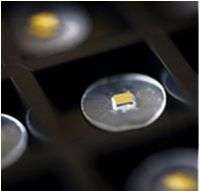November 10, 2010 report
Chip-in-a-pill may be approved in 2012

(PhysOrg.com) -- Giant Swiss pharmaceutical company Novartis AG, based in Basel, is developing a pill containing an embedded microchip, which it hopes to submit for regulatory approval in Europe within 18 months. The chip is activated by the stomach acid, and transmits information to a patch attached to the patient's skin, which then sends it on to a doctor via the Internet or a smartphone.
The first application of the chip-in-a-pill -- or as it is officially known, the Ingestible Event Marker (IEM) -- is expected to be for transplant patients, to help avoid organ rejection. A common problem that occurs after transplant operations is the dose and timing of taking anti-rejection drugs has to be monitored and frequently adjusted to prevent rejection of the transplanted organ, such as a kidney. The microchip would overcome this problem since it would closely monitor the patients to determine if the drugs are being taken at the right time, and in the correct dosage.
In January this year Novartis spent $24 million on securing access to the ingestible medical microchips technology, which was invented and developed by a privately-owned Californian company, Proteus Biomedical. Licensing the technology puts Novartis ahead of all its competitors. The Proteus microchip is capable of collecting a range of biometric data such as heart rate, body temperature and body movements, which may indicate if drugs are working as intended.
Spokesman Dr. Trevor Mundel, the company’s Global Head of Development, said Novartis does not expect full clinical trials of the "smart pills" will be needed because the microchips will be added to existing drugs, and the company intends to carry out bioequivalence tests instead to show the effects of the pills are unchanged by the addition of a tiny microchip.
Mundel said the regulators had been encouraging and like the concept, but “they want to understand” how patients’ privacy will be protected in a system in which information is transmitted via wireless or Bluetooth technology from inside their bodies, and which could presumably therefore be intercepted by someone other than the doctor for whom it was intended.
Mr Mundel said the first application for the technology would be for anti-rejection drugs for transplant patients, but added he sees "the promise as going much beyond that."
© 2010 PhysOrg.com















